Can goats eat figs? Risks, Benefits & Tips for Feeding
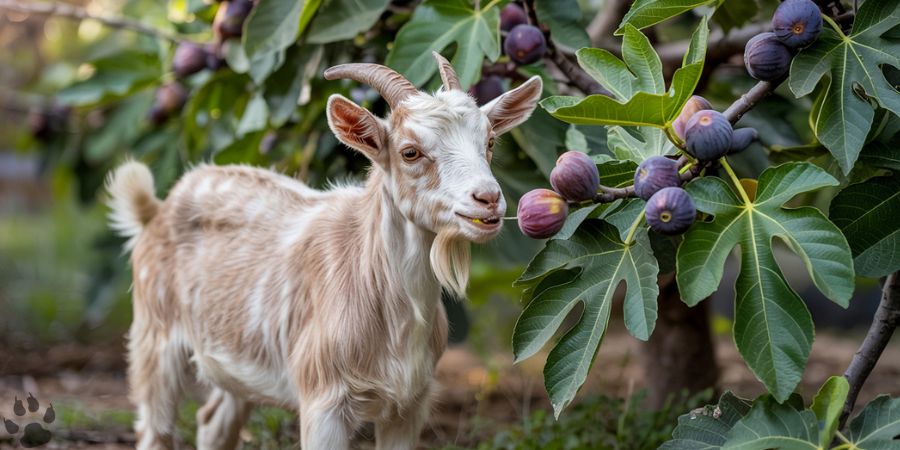
As a goat owner, you’ve probably noticed how curious and fun-loving these animals are, always nibbling on almost anything they can find. So, if you’ve caught your goats near fig trees, you might be wondering: can goats eat figs?
Well, the short answer is yes, but it’s important to understand that moderation is key. Figs can make a great occasional treat for your goats, offering beneficial nutrients like calcium, phosphorus, and potassium.
However, due to their natural sugars, they should be fed sparingly. In this article, we’ll take a deep dive, explaining the nutritional value of figs, how to properly prepare and serve them, and the quantity you should feed.
It’s also important to watch out for potential concerns and dangers when offering figs to your goats.
Are figs safe for goats?
Figs, part of the fig family (Moraceae) and the ficus tree, are a perfectly safe treat for goats when given in moderation. Unlike some fruits that goats won’t eat, such as citrus fruits, figs are an excellent treat and a great alternative to traditional fruits.
Their shape and size, resembling a teardrop or thumb, make them easy for goats to handle and enjoy.
However, figs do contain oxalates, a naturally occurring substance in plants, which can act as a laxative when consumed in excess, potentially being detrimental to a goat’s health.
Goats are often picky eaters, so it’s important to experiment and observe if they like figs. The flavour and texture of figs can make them an interesting addition to their diet, but always ensure they are given in moderation for safe consumption.
Nutritional Value of Figs for Goats
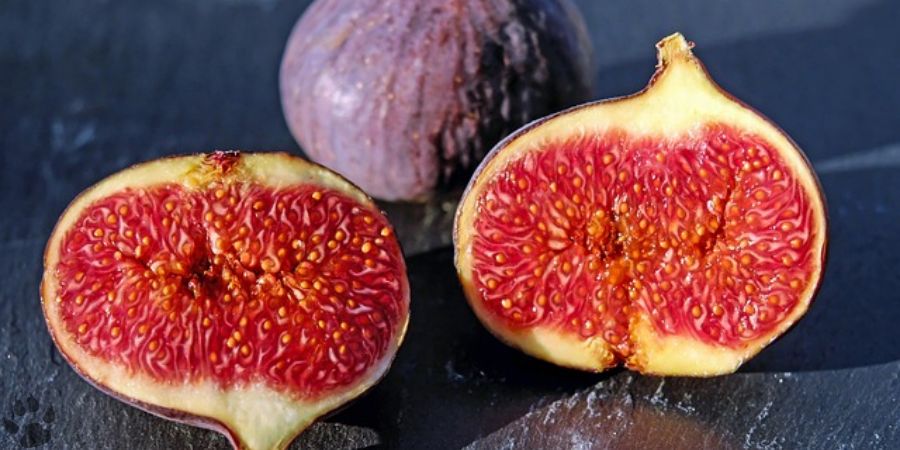
When feeding goats, it’s important to provide a balanced diet that meets their nutritional needs, and figs can be a great addition. These delicious and nutritious fruits offer a variety of essential nutrients that support a goat’s overall health.
While figs should be considered as a treat rather than a primary food source, they provide a detailed boost to their diet.
Adding figs for goats can enhance their nutritional intake, making them an excellent choice for an occasional snack that is both tasty and healthy. Let’s dive into the nutritional benefits of figs for goats.
1. High in Fiber
Figs are a very popular fruit because of their high fiber content, making them a beneficial addition to a goat’s diet. Fiber is very important to maintain a healthy digestive system, helping prevent constipation and promoting smooth digestion.
By encouraging regular bowel movements, figs support the gut in moving waste efficiently, ensuring the digestion process remains healthy and efficient for the goat.
2. Rich in Antioxidants
The antioxidants in figs are essential for maintaining the overall health and well-being of goats. These antioxidants help protect the body’s cells from damage caused by free radicals, supporting the goat’s immune system.
Including figs in a goat’s diet can help reduce the risk of various diseases and boost their natural defenses, contributing to a stronger, healthier goat.
3. Provides Key Vitamins and Minerals

Figs are a good source of vitamins and minerals, offering essential nutrients that contribute to a goat’s overall health.
They are rich in vitamin A, which is important for good vision and healthy skin, and vitamin C, known for its immune-boosting properties.
Additionally, figs contain potassium and calcium, which are crucial for maintaining fluid balance in the body and promoting strong bones and teeth.
These nutrients make figs a beneficial and healthy addition to the goat’s diet when provided in moderation.
Moreover, figs are a great source of vitamin K, which is essential for bone health. It plays a vital role in the goat’s bone metabolism and helps protect bones from fractures.
Vitamin B6, a water-soluble vitamin found in figs, also offers valuable benefits for brain health, supporting the goat’s ability to break down dietary proteins and create new proteins, ultimately enhancing its overall health.
Regular inclusion of figs can reduce the risk of heart disease and even improve eyesight and eye health.
As with any new food, it’s best to introduce figs to a goat’s diet slowly, especially if they haven’t had them before, and observe how they react.
Too much at once can cause digestive upset or even diarrhea, so moderation is key to ensuring the goat enjoys the benefits of figs without any side effects.
4. Magnesium
Magnesium is an important mineral found in plants, including figs, and plays a vital role in various reactions in the body. This mineral helps improve energy levels, allowing goats to stay active and healthy.
Additionally, it can increase muscle movement and help lower blood pressure, supporting overall well-being. As a naturally occurring substance in the earth and sea, magnesium is crucial for maintaining the goat’s bodily functions, making figs a great choice for boosting their health.

5. Copper
Copper is a vital mineral that plays a key role in various processes within the goat’s body. It supports energy production and metabolism while also aiding in the formation of connective tissues and blood cells.
By consuming figs, which contain small amounts of copper, goats can benefit from this essential nutrient, helping to maintain overall health and vitality. Including figs in their diet can be an excellent way to support these crucial bodily functions.
Benefits & Risks of Figs to Goats: Quick Overview
| Benefits of Figs to Goats | Risks of Figs to Goats |
| Supports Milk Production | Choking Hazard |
| Boosts Fertility | Can Cause Diarrhea |
| Aids Digestion | Pesticide Exposure |
| May Attract Other Animals |
Benefits of Feeding Figs to Goats
1. Supports Milk Production
When it comes to feeding figs to goats, I’ve personally seen a positive impact on milk production—both in quantity and quality.
Figs are rich in calcium, which plays an essential role in building strong bones and teeth, and this support extends to the overall health of lactating goats.
The vitamins and minerals found in figs enhance the nutritional value of the milk produced, making it more beneficial not just for goat kids but also for humans who consume goat milk.
This crucial role of figs in diet can actually increase output, and that’s something any farmer would appreciate for both animals and their caretakers.
2. Boosts Fertility
Including figs in a goat’s diet can have surprisingly beneficial effects on fertility, something I’ve noticed in small herd management over the years.
These fruits contain high levels of antioxidants and phytochemicals that help reduce oxidative stress, supporting the reproductive health of both male and female animals.
When stress levels are managed, it becomes easier for hormonal balance to occur naturally, which is essential for successful breeding and healthy offspring.
In fact, the nutrients in figs actively support reproductive organs, and regular inclusion can increase overall fertility rates.
Goats that consistently consume figs seem to have better chances at reproduction, making this simple fruit a powerful natural enhancer.
Whether you’re a farmer or just keeping a few goats for milk, adding figs might just improve your herd’s breeding success.
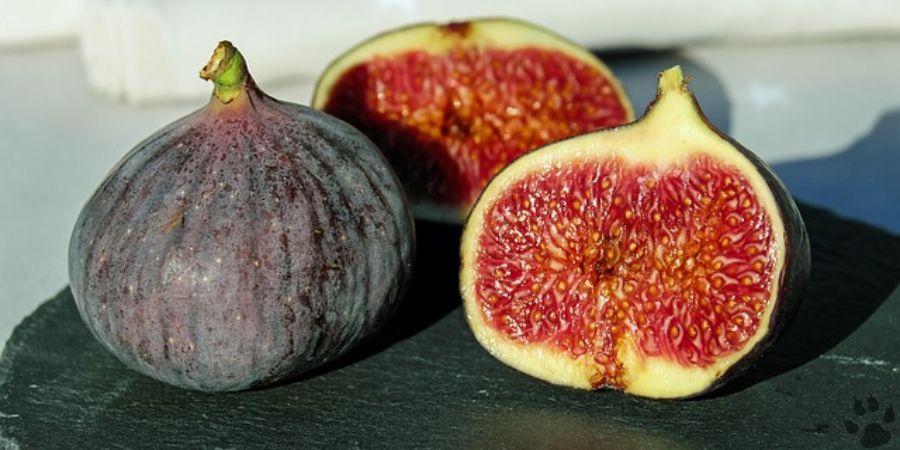
3. Aids Digestion
One of the underrated advantages of feeding figs to goats is how well they support digestion. Figs are a natural source of dietary fiber, which plays a crucial role in maintaining a healthy digestive system.
This fiber helps regulate bowel movements, preventing constipation and promoting regularity.
Even more, figs act as a prebiotic, offering nourishment to the beneficial bacteria in the gut, which in turn helps enhance digestion and improve nutrient absorption, vital for the overall health and well-being of the animal.
However, figs should be fed in moderation. While they’re beneficial, excessive consumption can lead to digestive issues, including diarrhea.
To avoid that, always consult a veterinarian or an animal nutritionist to determine the appropriate amount for your goat’s diet. In the right portions, figs can be a digestive game-changer.
Risks of Feeding Figs to Goats
1. Choking Hazard
Although figs are a delicious, nutritious fruit enjoyed by both humans and goats, it’s important to be cautious when offering them to your herd.
Goats are naturally voracious eaters, and they often consume food quickly without much chewing. Because of the small size and round shape of figs, there’s a real choking hazard, especially if a piece gets lodged in the throat, posing a potential risk of suffocation.
I always ensure the food is cut to a suitable size that matches the goat’s digestive capabilities, especially when feeding them fruits outside their regular diet.
2. Can Cause Diarrhea
While feeding figs to goats can be a fun and sweet surprise, giving them in excessive amounts might lead to digestive issues like diarrhea.
The high sugar content in this fruit can easily overwhelm a goat’s digestive system, resulting in loose stools and even dehydration if not caught early. Always monitor their intake closely and avoid overfeeding.
Instead, let your goats consume only small quantities as an occasional treat, just enough to enjoy without upsetting their stomachs.
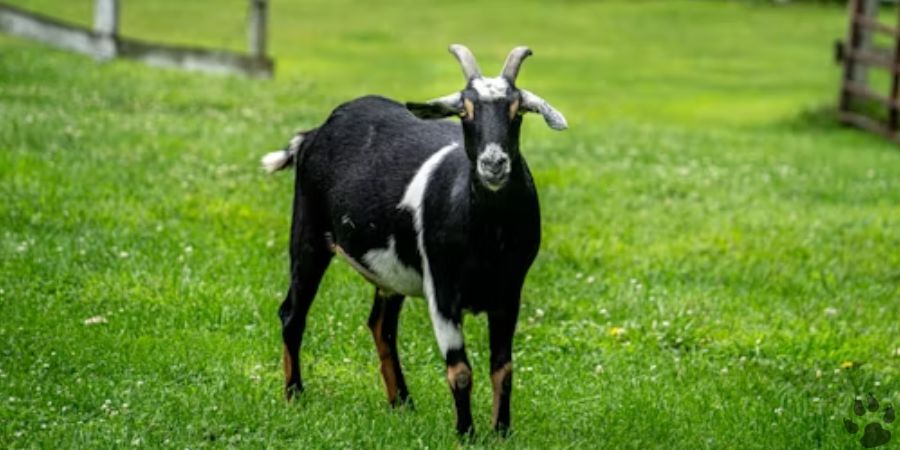
3. Pesticide Exposure
When feeding figs to goats, one of the potential risks that often gets overlooked is pesticide exposure.
Many store-bought fruits, including figs, are treated with pesticides to protect them from pests and diseases, but those same sprayed chemicals can be harmful if consumed by animals, especially goats.
These harmful chemicals may cause adverse effects on a goat’s health, especially if fed regularly. From my own farm experience, it’s absolutely essential to either choose organic figs or make sure they’re thoroughly washed before offering them to minimize the risk.
4. May Attract Other Animals
While feeding figs to your goats can be a treat for them, it can also attract other animals to the feeding area. The sweet scent of figs is incredibly appealing and can entice wildlife, such as birds, raccoons, and even bears.
This increased competition for food can lead to conflicts between species, which may disturb the goats or pose a danger to them.
To avoid such encounters, it’s crucial to maintain a safe environment by limiting access to the figs and monitoring the area closely.
How to Prepare and Serve Figs for Goats?

1. Wash Thoroughly
Make sure to clean figs properly before feeding them to goats. Even though figs are soft and sweet, they can still present risks if not cleaned properly.
It’s essential to remove any dirt, pesticides, or residues that might be sitting on the skin, as these harmful substances can affect your goat’s health.
I always make sure to rinse the fruit under running water and gently scrub it with a soft brush—this helps keep the nutritious parts of the fruit intact while clearing out impurities.
Proper cleaning ensures that the figs stay as healthy for your animals as they are delicious.
2. Lightly roasted
One popular method of preparation for feeding figs to goats is to roast them, just enough to warm them slightly. It’s an interesting way to feed goats without changing the fruit too much.
When done right, this simple and effective preparation method can be an excellent switch from raw fruit and works well as a soft snack or treat.
Just be careful not to overly roast, overcook, or burn the figs, as that can create a bitter taste or an unsavoury flavour that goats may reject.
A quick toss on the grill or in a pan, followed by a cool down, keeps things safe and tasty for your herd.
3. Chop or Slice
Once the cleaned figs are prepared for goats, chopping or slicing them into smaller pieces makes them much easier to eat and digest. I usually remove the stem and any hard parts of the fruit before feeding.
This way, it’s safe and gentle on their stomachs. The pieces can either be mixed into their regular feed or served separately as a little treat, depending on your routine.
4. Mix with Other Feeds
When feeding figs to goats, it’s smart to incorporate them by mixing them with other feeds like hay, grains, or fresh plant materials.
This not only adds variety to the diet but also helps provide additional nutrients that support the goat’s overall health and well-being. While figs are nutritious, they should not replace the regular feed—instead, they should be used to balance the diet.
To ensure goats consume all necessary nutrients, it’s important to offer figs as part of a complete meal rather than alone.
5. Offer Dried or Fresh
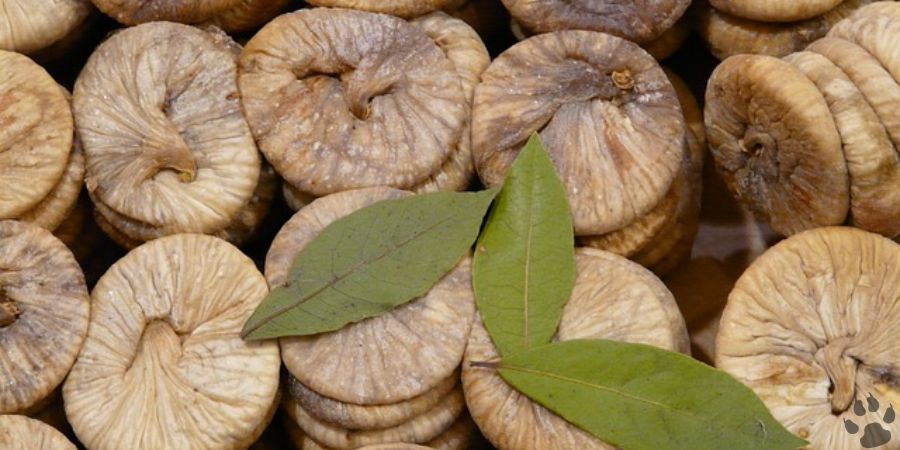
Both dried and fresh figs can be safely given to goats, and each form offers a different option depending on your routine and availability.
Fresh figs are juicier and more flavorful, making them a great occasional treat or snack, while dried figs have a longer shelf life and can be stored for a longer duration, which is handy if you’re managing feed throughout the seasons.
I’ve used both, depending on what’s on hand and how picky my goats are that day. Whichever form you choose, the key is moderation. Figs are a nutritious source of energy and fiber, but they should only be a small addition to a balanced diet.
Offering variety in feeds helps meet your goats’ nutritional needs and supports their overall well-being. It’s always a good idea to consult a veterinarian or an experienced goat farmer to make sure what you’re feeding fits your goats’ specific needs.
How Much Figs Can Goats Eat?
When it comes to feeding goats figs, it’s all about balance—yes, they’re a nutritious addition to their diet, but knowing the appropriate serving size is crucial.
In my experience raising goats, I’ve learned that moderation is key; while they enjoy the sweet flavor, overindulgence can upset their system. A few figs a couple of times a week works well, especially when mixed with their regular feed.
Important considerations include freshness and removing stems, making it a safe treat that supports variety without compromising health.
1. Limit Fig Servings
While goats genuinely enjoy the sweet and chewy taste of a fig, it’s essential to treat figs as an occasional snack, not a staple food.
From my hands-on experience, I’ve found that figs work best as a supplemental treat—something extra, not something regular. Overfeeding can backfire, and going overboard may disturb their digestive balance.
That’s why experts recommend limiting the number of servings to just a few pieces a day, depending on the size of the goat. Moderation is the key, especially if you’re aiming for a well-balanced diet that supports long-term health.
2. Avoid Overfeeding
Though figs are safe and sweet, overfeeding them to goats can quickly become a problem. Goats have surprisingly sensitive stomachs, and offering excessive amounts of figs may lead to digestive issues like diarrhea, bloating, or general upset in their digestive system.
From what I’ve seen on small farms, even a healthy-looking fig can stir trouble if not given in moderation. It’s always best to monitor their intake closely—what starts as a treat can easily turn into discomfort.
To avoid problems, keep figs as a part of a varied diet that includes fruits, vegetables, and mostly high-quality hay. If your goat shows any signs of discomfort, slow down on treats and consult a veterinarian immediately.
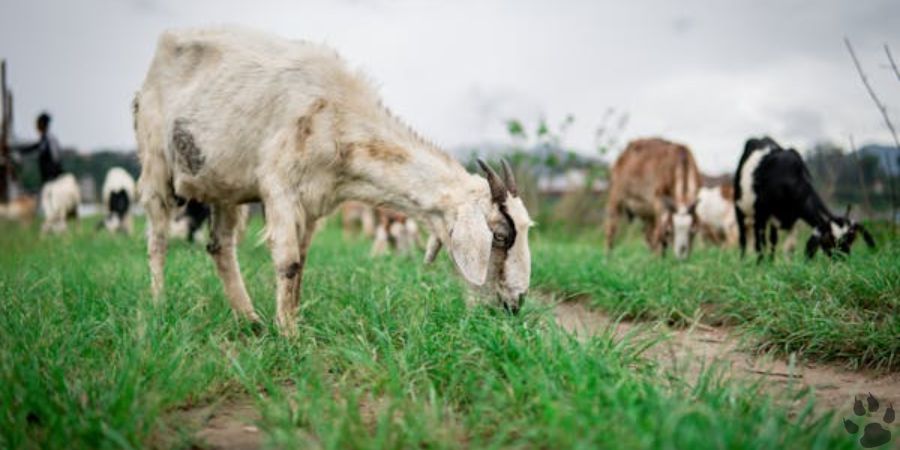
They can guide you in adjusting the portions and frequency without risking the animal’s well-being.
3. Watch Sugar Intake
Even though figs are packed with natural sugars, it’s important to be mindful of your goat’s sugar intake. Unlike humans, goats don’t metabolize sugar as efficiently, and this can lead to problems if you’re not careful.
Many animals, especially ruminants like goats, aren’t built for excessive consumption of sweet fruits, which can cause negative effects on their health over time.
I’ve seen cases where too many figs led to minor weight gain or even early signs of tooth decay. Worse yet, too much sugar might trigger metabolic disorders that are tricky to reverse.
The goal is always balance—use figs as occasional treats, and consider mixing in low-sugar options like leafy greens or fibrous veggies. If you notice anything off or have concerns, never hesitate to consult a veterinarian who understands small livestock.
4. Best as an Occasional Treat
While goats enjoy the taste of figs, these sweet fruits are best served as an occasional treat rather than a regular part of their diet.
While they do get excited over figs, their nutritional needs are better met through high-quality hay, fresh water, and a balanced feed.
Figs do offer some nutritional benefits and can add variety and enrichment, but they should never replace the staple foods that keep goats happy, healthy, and well-balanced. Figs are a fun addition—just not a daily one.
Can baby goats eat figs?
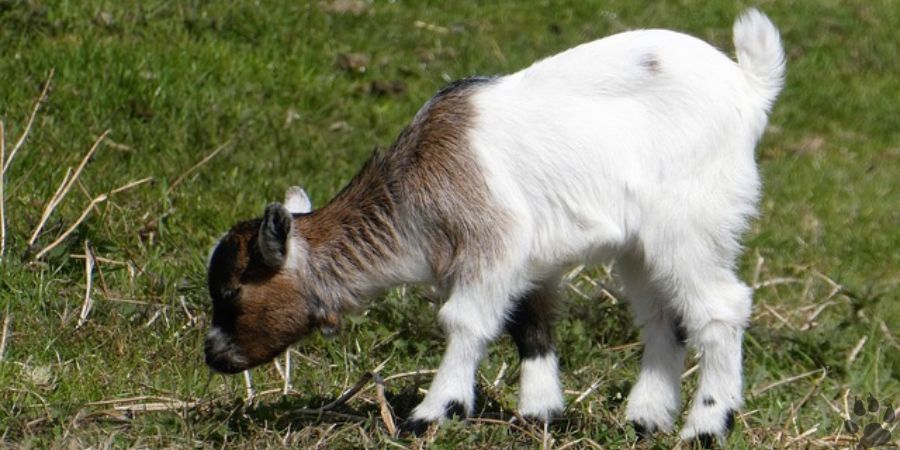
Baby goats are typically not ready to eat figs immediately after they’re born. In their early weeks, they depend on their mother’s milk for nourishment. However, as they grow and reach about a month old, they may start exploring other foods.
While they can try figs, it’s best to introduce them in moderation and only in small quantities. Their primary diet should still consist of hay, grass, and other staples until they are older and their digestive systems are more equipped to handle such treats.
Can goats eat figs with leaves?
Goats may eat the leaves of a fig tree, but it’s important to be cautious. Fig leaves are known to be poisonous and can be dangerous for goats in large amounts.
While they might love nibbling on plants, including fig leaves, they should not make these leaves a regular part of their diet. An exception might be if there is a surplus of leaves, and you want to get rid of some.
However, it’s always best to prioritize safer fruits like strawberries and plants to avoid any health risks.
Conclusion:
Figs make an enjoyable treat for goats, providing nutritious benefits when given in moderation. They offer a good source of fiber, antioxidants, vitamins, and minerals, contributing to the goat’s nutritional benefits.
However, due to their high natural sugar content, they should be fed sparingly to prevent any health issues like digestive upset or overfeeding.
If prepared properly and given in the right quantity, goat owners can safely include figs as an exciting variety in their goats’ diet, ensuring they receive supplemental nutrition without compromising their overall health.
It’s important to follow proper guidelines for serving to reduce risks.
Frequently Asked Questions
Can goats eat fig trees?
Yes, goats will happily eat fig trees. They often enjoy chomping on the entire tree, including the fruits and leaves. The fig plant is edible for them, and they absolutely love nibbling on it.
Can Nigerian dwarf goats eat figs?
Nigerian dwarf goats can eat figs as they are edible, but it’s important to limit the quantity and frequency they consume them. Figs can be a good treat, but overfeeding may lead to a laxative effect, which can be harmful.







